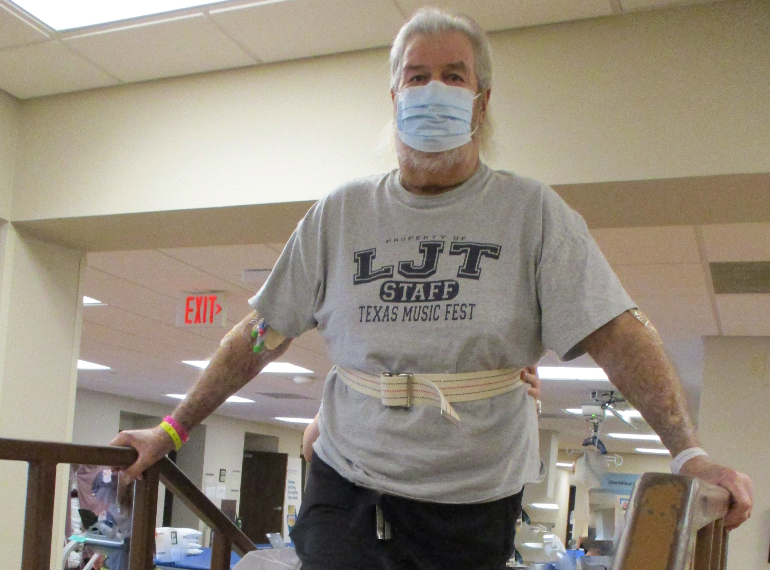Mark's Story

Medically complex
Imagine losing two months of your life. You go to sleep and when you awake two months later, you find that even the simplest tasks, like sitting up on the side of your bed or brushing your teeth, are impossible to perform without help. You’re confused, hallucinating and unable to tell if what you’re experiencing is real or a vivid dream.
Mark Sanders, a 63-year-old construction worker from Ennis, Texas, doesn’t have to imagine—this was his reality. “July and August never existed,” Mark recalled, “I woke up and couldn’t walk. It was hard.”
Mark was admitted to the emergency room at Baylor Scott & White Medical Center – Waxahachie with severe abdominal pain. Hospital staff discovered that his appendix had become inflamed and necrotic, his bowel was not receiving enough blood to function properly, his intestines had been perforated in one or more places and he was leaking fluids from his digestive system. Mark was moved to Baylor University Medical Center (BUMC), where he would spend seven weeks in the intensive care unit. BUMC staff performed multiple exploratory surgeries to discover, repair and remove damaged or dying sections of Mark’s bowel. They also installed a feeding tube to assist with his nutritional needs.
All of that was more than any person should have to deal with, but Mark also suffered significant respiratory difficulties. This required the insertion of a breathing tube through his nose no less than three times and culminated in acute respiratory failure that necessitated a tracheostomy.
Incredibly weak, unable to care for himself without help, and experiencing chronic pain, Mark and his wife, Vicky, needed to decide where he would go for much-needed rehabilitation. They chose Baylor Scott & White Institute for Rehabilitation (BSWIR) – Dallas. “We chose Baylor,” Mark said, “because we have been here a long time and we like the facility and the care. We have had our family members come here for rehab, and they always left with good gains.”
So Mark, his wife and his rehabilitation team worked out a plan that would restore his strength and enable him to perform the day-to-day self-care activities.
Upon admission to BSWIR – Dallas, Mark needed complete assistance to get dressed, bathe and use the bathroom. He couldn’t stand or walk and quickly became fatigued when using his wheelchair or performing basic self-care activities. But this wasn’t going to stop him. Mark had a goal—he wanted to attend his granddaughter’s wedding under his own power. His wife had a goal, too. “I wanted him to get mobile, even if it wasn’t all the way. I wanted him to do something more besides lying in bed.”
In occupational therapy, Mark worked on strengthening exercises, standing balance and tolerance. Vicky and Mark took part in family training sessions where they learned self-care strategies for the home, like using the tub transfer bench and how to manage fistula and catheter bags.
His physical therapy began with sit-to-stand exercises and time spent standing between the parallel bars to strengthen his legs and core muscles. Mark’s physical therapist also had him use a mirror as a visual feedback device while working on his posture. After ten days of hard work between the parallel bars, Mark was able to walk 52 feet with his rolling walker. But for Mark, it wasn’t enough.
“It’s been kind of gradual progress,” Mark said of his achievements. Mark’s wife commented, “When we came here, I didn’t know he could do it. They push you, but also take into consideration his medical needs and modify what they do so he can do the best he can.”
By the time Mark was discharged from BSWIR – Dallas, he could sit up and stand at his rolling walker without help, get in and out of bed with supervision, go up and down stairs with little assistance, and walk more than 250 feet using his rolling walker.
Mark attributes a lot of his success to his wife, Vicky, “It was because of my wife that I got through the hard time.” Evening and weekend visits from his son and daughter-in-law helped him stay on track as well. And when he needed extra support, Mark’s therapy team was there for him.
“Overall, everybody that worked with me has been very good. [The therapists] really went out of their way to work with me. They give a lot of time to their patients,” Mark explained, “One day on the weekend, I didn’t have anything scheduled. I was having trouble with my depression, and [my therapist] came up to my room to just check on me. She took me out on the patio and kept me company and talked to me.”
Mark and his wife will be working together to continue his rehabilitation at home using everything they learned while at BSWIR – Dallas. For those facing similar challenges, Mark leaves this advice, “If you believe you can make a difference in your life, you will.”